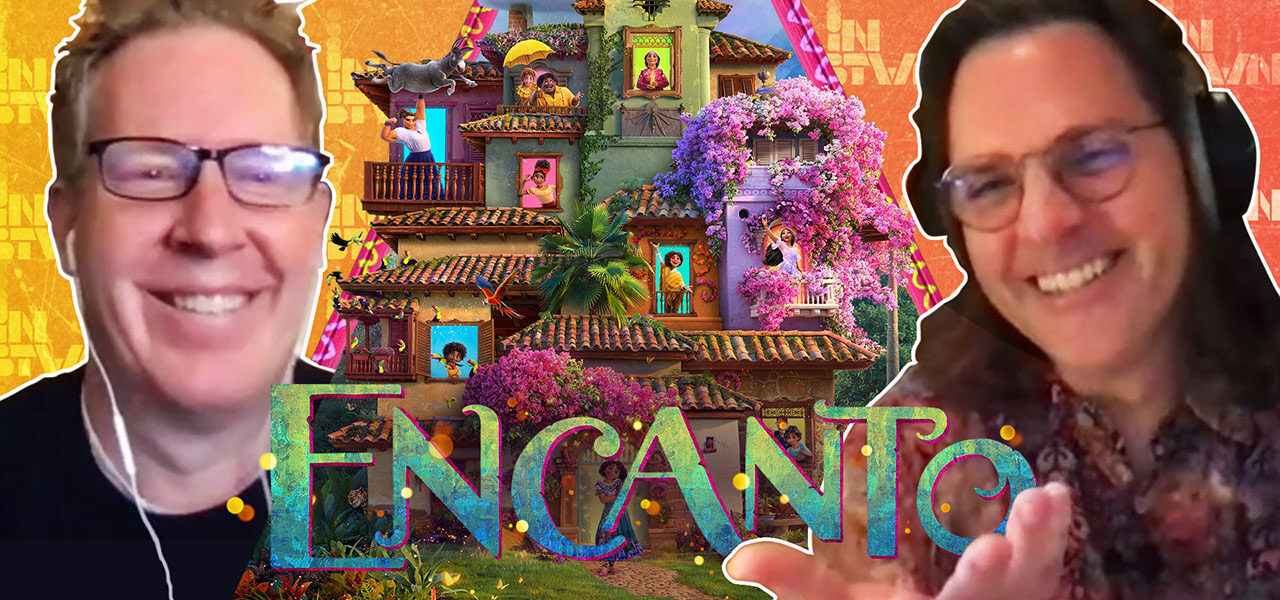

‘Encanto’ Directors Jared Bush And Byron Howard On Avoiding Tropes And Crafting A Unique Story (Video Interview)
Encanto could have easily become a Mirabel and Bruno buddy story, but “from the beginning we knew we didn’t want to fall into that trope,” explained Byron Howard, one of the directors on Walt Disney Animation Studios’s Encanto. The goal of avoiding conventional tropes became a goal throughout the production of Disney’s latest feature for Howard and fellow director Jared Bush.
This topic and many others is explored in an intimate conversation with the directors, who recently spoke with INBTWN Animation, the official online event partner of Cartoon Brew. Watch the interview:
Encanto is a story about a gifted Colombian family, with each member in possession of a fantastic gift, reflective of their role in the family. In order to focus on the family, Bush noted that if “we want this to be about an extended family, we can’t leave their home. If we want them to be a part of the story, then we need to find a way that that home is really the core of where that story is set.”
Howard said that the real key to avoiding tropes was in “the time we’re given to iterate things” as the production period on Encanto stretched for five years from concept to finished work. “I don’t know that the public understands that a lot of this isn’t actually producing what you see on screen, but it is sort of that psychology and that introspection that happens years before. We’re building these movies from scratch … the story didn’t exist in the world before this team put it together.
Working with self-imposed limitations allowed Howard and Bush to approach the story telling in a unique way for animation, borrowing from a more theatrical background. This was on their minds from the beginning. “The theatrical thing was very intentional… we were thinking theater the whole way through” recalled Howard.
Bush’s work on Moana led him to connect with theatrical maestro Lin-Manuel Miranda (In the Heights, Hamilton), who was a key collaborator throughout the production of Encanto. Howard noted, “We started talking to Lin on day one, which is really unusual. We usually don’t get our song-writers until very late in the game and this made a huge difference.”
The idea of a musical mystery came early too. It was “locked at screening two,” said Bush, and helped move the story away from the traditional idea of a quest. This was new territory for both directors as the previous tropes they would use to figure out the story were almost nonexistent. “There are not very many music mysteries; these two things are almost never combined,” Bush continued. “So there’s no template or trope to use for a musical mystery. And so a lot of that we had to kind of figure it out, and it was, kind of, new territory. And honestly, scary.”
They were able to lean on other contributors in order to help figure out the dynamics of their theatrical setting. “The answer is surrounding yourself with geniuses that can figure out these very difficult things,” Bush put it. “Our smartest move on this film was bringing in Charise [Castro Smith, co-director] as a partner to us, both as a co-writer and co-director, and really thinking through these character dynamics.”
Balancing a cast of 13 family members was challenging for them, figuring who appeared where, and being open to feedback. For example, in early versions, Antonio was absent second half of the movie, and the feedback was, “Where is Antonio?” The solution came by bringing Antonio back mid-point and having him invite Bruno to use his room for having visions.
Other changes include Bruno’s name, who was originally Oscar, but which ran into legal issues. “There must have been a certain number of Oscar Madrigals in that area that made that difficult,” said Bush. “The other reason to change it was, originally he was called Uncle Oscar. We didn’t use Tio; that came later. And so, Uncle Oscar, that alliteration felt good, but Tio Oscar didn’t feel exactly right.” The filmmakers sent a list of suggested names to Miranda, with Bruno on the list and “immediately he was like, ‘It’s Bruno,’ and I didn’t know why he was so definitive immediately … and then like a week or two later that song came out, and Bruno, no no no, and using the no’s.”
Encanto is a film centered around family and home, and it comes as no surprise that this movie was produced during the pandemic where the majority of its pipeline was completed in everyone’s homes. The circumstances help to give the film a unique flavor. Said Bush, “We were living out some of the things of the movie that definitely had a big effect.” Howard agreed: “It was a real illuminating look into people’s real lives. We all got a lot more honest with each other.”

.png)